By Barry Zander, Edited by Monique Zander, the Never-Bored RVers
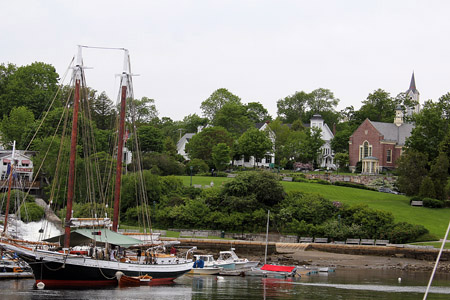
Camden Harbor -- a classic port on Maine's Mid-Coast
Saturday we entered North America’s sixth time zone, the Atlantic zone. We have traipsed back and forth through the four well-known time zones of America for years, and in 2010, we found out there was an Alaskan zone when visiting that state. But it wasn’t until Monique planned our crossover into Franklin Roosevelt’s Campobello Island that we realized that we were going into New Brunswick, Canada (passports shown), which is on Atlantic Time.
We are “Downeast,” parked at Eastport, Maine, close enough to Canada to intermittently get phone service from our neighboring country, which is a cause for concern, because it means we are on “roaming.” If you’re going into Canada (or Mexico), I suggest that you check with your carrier on options and policies.
What is “Downeast”? According to a brochure, it’s this area of the northern Maine coast that Boston ships approached by going downwind while headed eastward. Eastport is the first “city” to see the rising sun (as compared to Lubec, the first “town” to greet the sunrise).
Campobello is just five miles from here, according to the GPS; however, once you get on the road, it shows 45 miles. The five-mile route is across the bay, and there is no bridge, so one must drive to Lubec to cross.
On the island, we began our tour by entering the FDR cottage in the two-nation park, filled with the history of our longest-serving president, who was in office during some of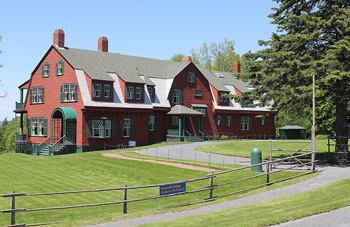 America’s most troubling times. We ended our visit there by attending “Eleanor’s tea” – tea and cookies in a civilized setting – where docents provided us with details of the modest life of Eleanor Roosevelt on the island and her controversial leadership in America and the world.
America’s most troubling times. We ended our visit there by attending “Eleanor’s tea” – tea and cookies in a civilized setting – where docents provided us with details of the modest life of Eleanor Roosevelt on the island and her controversial leadership in America and the world.
The brochures say, “See the reversing falls” at Pembroke, Maine, but we were there at low tide. On our way to Lubec and then Campobello, we decided to take a look at the falls that “go upward.” As explained to us by a lady we met on the trail, the reversing falls are actually created when the 28-foot tide comes in. If you’re in the neighborhood and interested, check a tidal schedule before journeying into the wilds.
AHOY FROM THE SCHOONER SURPRISE
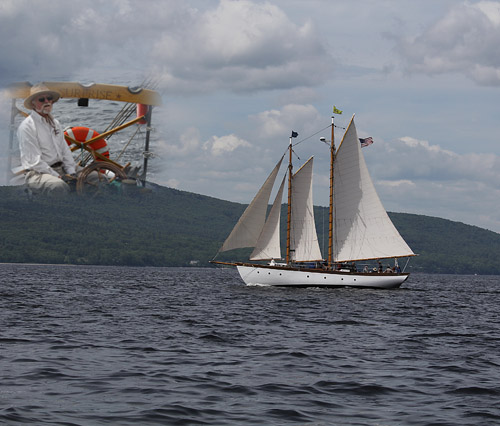
Skipper Jack pilots the Schooner Surprise. Since I couldn't take a photo our our boat at sea, I settled for a similar schooner as it passed by.
The Camden-Rockport-Rockland is called “The Jewel of the Maine Coast.” Snuggled along the rocky shores of Penobscot Bay is the scenic town of Camden on the “Mid-Coast.” It was from that picturesque harbor that we shipped out with local Fred Darrow aboard the Schooner Surprise for a two-hour cruise (without Thurston P. Howell III, Maryann or the rest of the Minnow’s complement). After days of dreary weather, the sun shone and the wind was fair. Like having lobster, it’s just not Maine without going asea at least once.
In addition to ascending to the summit of Mt. Battie, an overlook for that harbor, we also entrenched ourselves in some of the highlights of that “jeweled area.” We visited the three venues of the Farnsworth Museum, where I was personally impressed by the works of N.C. Wyeth (father of Andrew Wyeth) and feel that I learned things from the section that exhibited the photographic works of fourth and seventh grades of several local schools.
As part of our getting acquainted with the Camden-Rockland area, Fred drove by a small herd of “bandies,” formally “Banded Calloways.” Strange-looking cows.
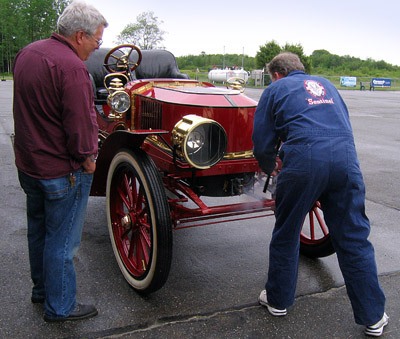
Winding up the Stanley Steamer for another trip
“That was a Stanley Steamer that just went by,” I yelled at Monique. We had just arrived at the Transportation Museum in Owls Head, which is another Mid-Coast community worth visiting. Having been to two car museums during this trip, we didn’t expect to see anything new at this one. We stayed for more than two hours, soaking up history on wheels and in the air, chatting with drivers/pilots and restorers.
Then we stopped by the Owls Head Light, a working lighthouse manned by the U.S. Coast Guard. That, in itself, was not one of the most scenic, but on the way to the state park where it’s located, we stopped by a fishing dock, where a seaman pulled up our dinner in a trap filled with the freshest of lobsters ($5.00 a pound).
LIGHTS AND COLLECTIBLES
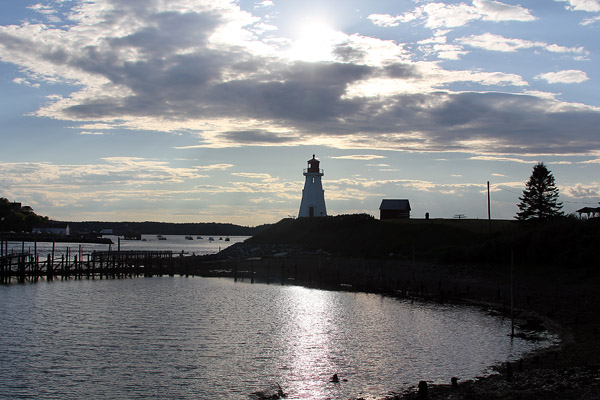
Since 1886 the Mulholland has stood guard on Campobello Island
There are hundreds of “lights,” the traditional name for “lighthouses,” along the Atlantic Coast, and I think by now we’ve seen half of them, with more coming when we cross into the Canadian Maritime provinces. Matter of fact, I think we saw five while on Campobello in New Brunswick. And like spotting eagles, covered bridges and waterfalls, each one is worth seeing.
Maine and much of New England is a land of cottage industries. Seems like every little rural house, cottage, cabin, mobile home, shop … any kind of structure along the road … sells, whether it be crafts, furniture, fudge, flowers, fresh farm eggs, or mostly antiques. We were on an isolated back road Saturday speeding past a lumpy dirt and grass driveway that curved and disappeared into the marsh when I briefly espied the “GIFTS AND COLLECTIBLES” sign. I can’t imagine who would have the guts to make that turnoff in hopes of finding a gift.
I take photos everywhere we go. While I keep in mind the need to dress up these blogs and someday to actually sell a few, they are mainly so we remember the places we’ve been. It seems like for as many places I have photographed, there is an equal number where we couldn’t stop because we were a quarter-mile down the road with our trailer behind us before we decided, “Oh, that would have made a great shot!” Just as often, we see something notable, but there’s no place to pull over, plus it seems that while we may travel five miles without a car in sight, suddenly there are six of them lined up waiting to pass. For instance, when we stopped in Washington, New Hampshire. I missed the very first “Seventh Day Adventist Church,” but did catch the sign that noted that this was the first town in American named after our first president. You win some, you lose some.
If the trailer is parked and we’re motoring along in the GMC, it’s a bit easier, but even then we miss quite a few. Here are a few interesting shots from recent days:
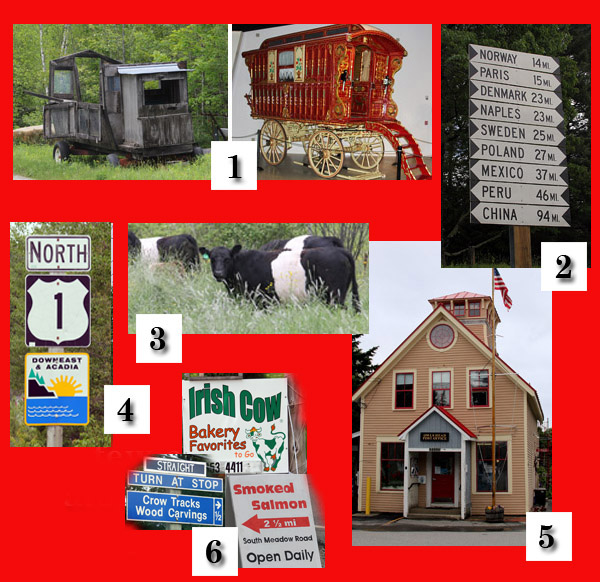
SOME OF THE SITES WE'VE SEEN DURING RECENT DAYS ARE: 1) A decaying gypsy wagon along a remote highway ... and a shined-up wagon at the Owls Head Transportation Museum; 2) International travel without leaving Maine; 3) "Bandies" in Rockport; 4) Downeast & Acadian Byway sign; 5) The Owls Head Post Office; and 6) Cottage industries are everywhere
Finally, when I think we’ve seen it all, navigator Monique reminds me that we have only had a glimpse of the Coastal regions, and even less of the Maine interior. It would take months to travel every side road reaching the shoreline of every town, although most of the detours would be worth the time and fuel. If you’re coming this way, it’s a good idea to do research to pick and choose the places to visit.
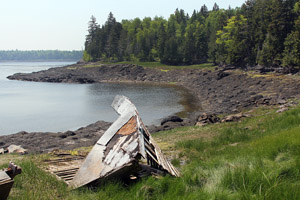
The tide was at it's low point at Pembroke. Next time we'll check the tidal schedule.
From the “Never-Bored RVers,” We’ll see you on down the road.
© All photos by Barry Zander. All rights reserved
Because of the numerous Spam comments on this site, the comments section has been deactivated. Please email us at [email protected] and I will pass along your comments. Learn about Alaska and see travel photos at ontopoftheworld.bz (and much more to come when time allows).